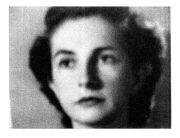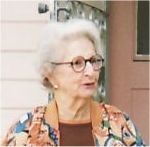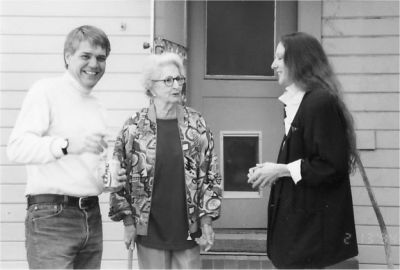by Gilles d'Aymery

Rene Stark, 1941 (Pierena Zamaroni) |
(Swans - October 22, 2007) Few people ever heard about Rene Stark, who died on August 31, 2007. She was 96. Her entire life embodied kindness and an almost radical, or feminist independence balanced with a mix of acceptation, a strong will, a refined sense of humor with a contagious laugh, and deep privacy. She was well read, loved classical music, and was a great conversationalist. She touched many people along her life, always in quiet, subtle, and friendly ways, even though her journey was not always lined with roses and bougainvilleas. To get a sense of Rene one needs to look into her formative years and her past, of which she rarely talked but which was made possible thanks to a short book she wrote in the mid-1990s, Parallel Stories (1996). She self-published it in a limited number of copies -- one of which she generously presented to Jan and me with her affection. The book was written for her daughter and son-in-law Sally and Dick, her daughter Nancy, and her grandchildren Bryan, Kate, and Anne. Parallel Stories reconstructs the various phases of her parents' life, from their birth in the 1870s in Switzerland to their death in America. The narrative is that of her father and her mother written in alternate short chapters. Through Rene's pen and memories, her parents tell their story to their grandchildren and great-grandchildren. She, in typical Rene fashion, only mentions herself on a couple of occasions toward the end of the book: once to acknowledge her birth, and once on a visit to her mother in Capitola at the twilight of her mother's life.
Rene was born Pierena Zamaroni on August 18, 1911, in what was then the small rural community of Ceres, Stanislaus County, in the Californian San Joaquin Valley, about five miles South of Modesto. Her parents, Vincenzo and Giacomina, owned a dairy farm. Both were born in Avegno, Switzerland, a small, secluded village in a valley surrounded by Alpine mountains. Her father was born in 1875. At age 17, he left the village and immigrated to the United States. He worked on a large dairy ranch near Santa Barbara for a few years, first as a milkman, then a butter and cheese maker. He saved some money and eventually returned to the old country and married Giacomina (born in 1878). They had known each other since childhood, and while Vincenzo always wanted to marry her, he was not her first choice. She had fallen in love with Vincenzo's best friend, a boy named Rico. Furthermore, she was a bright young student and had been offered to attend a Teacher's Academy to become a schoolteacher. Sadly, she never was able to enroll in that academy for her mother suddenly died. She had to stay home with her father to take care of her younger sisters and brother. Then, to further deepen her sorrow that would follow her for very nearly the rest of her life, Rico died too, of leukemia. So, two years later when Vincenzo came back and proposed, she accepted, though with some reluctance. She had hoped that her husband would settle back in the village. With the money he had saved, she felt they could buy a few cows, chickens, even a pig, and live a quiet life in the village she held dear to her heart.
Vincenzo was a young and impetuous man who quickly grew dissatisfied with his life in Avegno and within two years he decided to go back to the New World. She resisted as much as she could, yet had to resign herself to her condition. Then, "a wife was obedient to her husband." She appeared to be so stressed by having to leave her family, her friends, and her beloved village that she had a miscarriage in the period leading to their departure. Once in America, back to Santa Barbara, Vincenzo lost no time. He leased some acreage with a small house, bought 24 cows and 2 horses, and became an independent milk farmer -- his own boss -- for the next eight years. He grew tired of the work though, but circumstances were in his favor. Someone wanted to take over his lease and the animals, and concomitantly the opportunity to lease an inn owned by Swiss friends in Santa Barbara arose. He made the switch; she followed him with their three boys; they became innkeepers.
She initially enjoyed the move, the pleasure to live in a nice, big house in a beautiful town, but the joy did not last long. She had to carry all the duties, the daily chores of keeping the house clean and cooking for the boarders, as her husband only took care of selling beer, wine, and tickets to customers who played ball games in a bocce court located in the backyard. She worked hard; he little. Life took another turn, however, when they received the heartbreaking news that Vincenzo's father had died. It happened that their Swiss friends wanted to sell the house. They were able to break the lease amicably and they journeyed back to Switzerland.
Giacomina hoped that they were back home for good, but once again, fate would decide otherwise. Vincenzo got into a dispute with his sisters regarding their father's house. He, as the head of the family (being a male), wanted the house in which his sisters lived. As they could not agree, Giacomina was asked to decide who should keep the house. She sided with the sisters. Her husband was furious and immediately decided to go back to the U.S., with or without her and the boys. Once more she had to resign herself, but not before having made Vincenzo promise that he would eventually bring her father and her two sisters to the States, and to make sure it would happen she left her younger boy behind. Back in California, they settled with another Swiss family in Santa Cruz, before moving to the Central Valley where Vincenzo initially bought 60 acres three miles from Ceres, which over the decades grew to become a 140-acre farm.
Meanwhile, the family was reunited when her father, sisters, and her youngest son finally came to America. In 1911, Pierena was born. In 1913, the youngest boy suddenly died, to Giacomina's eternal sorrow and guilt. Then it was the turn of her father, who died in 1915 from influenza. She gave birth to her last son, who at age of three was diagnosed with spinal meningitis. She carried on her grief-stricken life, often depressed, often objecting to her husband's decisions, until he died in 1945 of heart failure. He was 70. He is buried in Modesto, and I understand his simple headstone read, "Here Lies a Swiss Dairyman." Giacomina went on to sell the farm and buy a small house in Capitola near Santa Cruz, where her sisters lived. There she seemed to have found some peace of mind and joie de vivre, which "erased the memory of unhappy years that had gone before." She died in 1972 at the age of 93. Also buried in Modesto, her headstone reads, "Rest in Peace."

Rene Stark, 1994 |
Rene grew up in that atmosphere on the dairy farm and one can imagine her instinct for independence and the desire to have her own life. Though she rarely talked about herself, her past, and her life, she once confided that she could not wait to leave the farm. She went to grammar school and high school in Ceres, and to junior college in Modesto between 1917-32 (according to the short obit that was published in the Modesto Bee). After graduation she got her first job at Stanislaus County Hospital. In 1936, she moved to Berkeley, where she worked at the University of California. She was then employed at the Modesto Title Company for a couple of years before going back to UC Berkeley at the Boalt Law School for three years. The next move was to the US Naval Air Station at Moffett Field until 1945. If that was not enough, she worked in a Palo Alto bookstore, before marrying G. Maynard Stark in 1947 in Palo Alto.
Mr. Stark was employed by the Food Machinery and Chemical Corporation (now FMC Corporation). They had two daughters, Sally (1948) and Nancy (1951). Rene became a full-time mother. Stark was eventually transferred to Lawrence, Kansas, where the family lived for 14 years until he was reassigned back to Modesto in 1972. Upon his retirement two years later, they eventually moved back to Palo Alto where he died in 1980. She then rented a small apartment in Menlo Park and began volunteering at a Palo Alto non-profit organization called Beyond War and subsequently renamed Foundation for Global Community, where I first met her in 1991.

The author, Rene Stark, and Jan Baughman, 1994 |
Rene would park her 1970s big American car in the parking lot (a Pontiac LeMans!), sign in at the front desk, walk to the mailing cubicle and go about her business. If there was no work at hand, she would read a book or come upstairs on the mezzanine to have a chat with us, the paid staff. She was ever friendly and sociable but most of the time she kept to herself and was always very private. She had strong opinions but expressed them rarely, and when she did it was with a bemusing tone and without acrimony. I recall asking her why she volunteered there, an organization essentially rooted in one of those new age religions that once upon a time proliferated in Northern California. "It keeps me active," she said; then she rolled her twinkling eyes, smiled, and added, "there are good people here; some who were born on the wrong side of the track and try to make a modest living." I don't think I ever heard her say anything nasty or negative about anyone in public. Even in private conversations, if ever slightly critical, she would make no harsh remarks, as though she had fully integrated the frailty of the Human Condition.
She was quite attentive to those she called the "modest people" and had a particular affection for the woman who took care of payroll and accounting and whose struggles in life were well known to some of us. "You stick to them. They have much to give because they have so little...always been like that..." And what's your greatest achievement, Rene? Laughing again, "Staying alive, ha, ha." Pause. "No, it's Sally and Nancy." She could talk at length about her daughters with much love and pride. "The past need not repeat itself," she'd often say. She had good reasons to be proud: Sally married an entrepreneur and built a very successful business with him as well as a superb family. Nancy is a strong-willed woman, a registered nurse at UCSF. Both are highly independent. ("Did I tell you about independence, Gilles? Well, they are, aren't they?")
But she'd never talk about her marriage or peep a word about her husband. "It was not a particularly happy marriage, so why talk about it?" And she would abruptly move away from the topic. "Here, I brought you the last two issues of The New Yorker." Much, much later, I was told that her husband had Alzheimer's for seven years and she had taken care of him till his death. The day would come to an end, she'd get in her car, out of the parking lot, left on Alma Street, and accelerate like a Formula 1 driver, breaking hard to turn right at the next corner on the way back to her small apartment.
Then one day, in 1999, she did not show up. She was 88. She was in Stanford Hospital with a bowel obstruction; too frail for surgery, we all came to offer our goodbyes. She was at peace. "It's time to go," she'd say. Days went by but it was not time, as yet. She somehow recovered and was released from the hospital. However, she had become frailer and could not drive any longer. Arrangements had to be made. I suppose she could have gone to live with Sally and her family but her unflinching independence would not let her do it. She moved to Glenwood Inn, a retirement home in Menlo Park. "Why would I want to be a burden to my kids?"
I visited her often and we'd spend an hour or so talking about things. Why did you not write about yourself, Rene, but only about your parents? "There is not much to write about oneself. I wanted my daughters, and grandchildren, and great-grandchildren to know about their origin. Perhaps Sally and Nancy will write something about me, for the next generations."
The last time I visited her to bid farewell as I was leaving the Bay Area, I remember her very last words to me. "You be kind to Jan, Gilles, always, you hear."
Rene Stark was a remarkable woman and I loved her very much.
Note
Here is the short message I posted on the guest book appended to her short obituary on Modesto.com:
I simply loved Rene; loved her joie de vivre; her laughter; and oh those sprinkling eyes!
I used to pick her up in my arms and whirled her around like in a tourbillion of dancing.
Her kindness and free spirit reminded me of my grandmother, and this is how I shall always remember her.
My deepest condolences and sympathy to Nancy and Sally.
If you find our work useful and appreciate its quality, please consider
making a donation. Money is spent to pay for Internet costs, maintenance
and upgrade of our computer network, and development of the site.